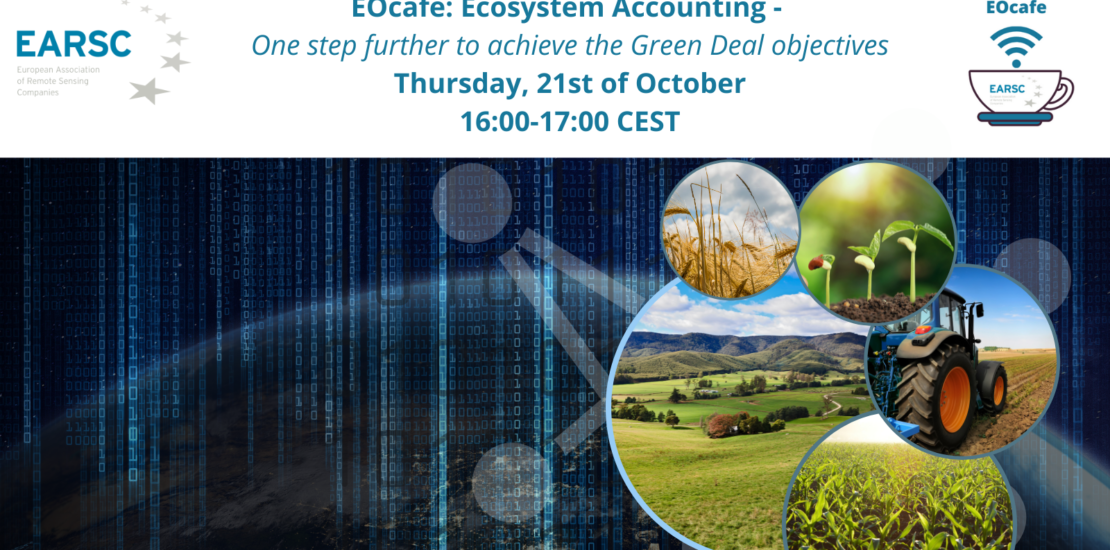- October 13, 2021
- Posted by: EARSC
- Category: EOcafe

Ecosystem Accounting, one step further to achieve the Green Deal objectives
Thursday 21 October 2021, 16h00-17h00 CEST
The System of Environmental Economic Accounting (SEEA) is the accepted international standard for environmental-economic accounting, providing a framework for statistics on the environment and its relationship with the economy. It brings together economic and environmental information in an internationally agreed set of standard concepts, definitions, classifications, accounting rules and tables to produce internationally comparable statistics.
In March 2021 the United Nations Statistical Commission adopted the SEEA Ecosystem Accounting (SEEA EA) as a new international statistical standard to integrate ecosystems and their services into national accounting, and to account for biodiversity and ecosystems in national economic planning and policy decision-making. This new international statistical framework brings a new paradigm shift in the appreciation and valuation of natural resources, allowing countries worldwide to use a common set of rules and methods to track changes in ecosystem assets (e.g. ecosystem extent and conditions) and related flow of services (i.e. ecosystem services), and to link ecosystem information to economic and development activities. The concept of Ecosystem Accounting provides also a new policy framework underpinning the development of ecosystem-related indicators from other international agreements including the CBD post-2020 global biodiversity framework.
The EU Biodiversity Strategy for 2030 recognises the value of ecosystem accounting and has plans to include natural capital accounting into European legislations.
Earth Observations is widely recognized as a major source of information to monitor the extent, condition and services of their ecosystems. The advent of dense EO data streams at appropriate scales combined with the emergence of digital technologies offer unprecedented opportunities for countries to efficiently monitor the extent and conditions of their ecosystems and implement their ecosystem accounting.
The webinar will provide an opportunity to meet three experts on the field:
- Representative from the United Nations presenting the System of Environmental Economic Accounting (SEEA) framework
- Representative from the European Environment Agency (EEA) to emphasise the green deal and the importance of natural capital accounting as one of the tools that needs to be developed to integrate biodiversity considerations into public and business decision making.
- Representative from the European Space Agency bridging the discussion on how earth observation is an enabling factor for ecosystem accounting and showcasing examples of ecosystem accounts including the changes in stocks of environmental assets.
In this EOcafe our host, Geoff SAWYER (EARSC’s Strategic Advisor and former Secretary General) together with our guests,
- Alessandra ALFIERI, United Nations Statistics Division (UNSD), Head of Environmental Economic Accounts Section.
- Jan Erik PETERSEN & Eva IVITS,European Environment Agency.
- Marc PAGANINI, European Space Agency (ESA), Directorate of Earth Observation Programmes.
will discuss the following:
- Earth Observation could help to assess the impacts on the state of the environment and on specific sectors of the economy. How can geospatial data and Earth Observation contribute to ecosystem accounting? What should be the kind of information needed to complement the ecosystem accounting?
- How in your opinion the “ecosystem accounting” supports the objectives of the Green Deal? how does impact into the EU Biodiversity Strategy for 2030?
- How does “ecosystem accounting” differ from the generic “ecosystem monitoring”?
- How do you see the way to engage with the private sector industry on this topic? How could industry partner with governments to create standardized accounting systems?
- “Natural capital accounting”, what does really means?
- What types of thematic topics are covered within the ecosystem accounting? And what kind of information does the “ecosystem accounting is looking for in for example air emissions, land accounts, agriculture?
- How can the EO service companies be involved in this business? What should EARSC do next to explore these opportunities?
- …
Registration: The webinar is open to ALL but priority will be given to EARSC members. Registration is free but compulsory. Please click on the following link to register.
Registration link
Please note this is a virtual event!
EOcafe is part of a series of EARSC meetings that offer timely, relevant, and practical information on a broad variety of topics related to the EO sector. Join us every two weeks to discuss and network while enjoying a cup of coffee with friends.
IMPORTANT NOTES!!!
- The use of a video camera is not mandatory but encouraged to facilitate better interaction among the attendees and the guest speaker(s).
- The EOcafe will stay open after 17:00 in case our guests want to continue the discussion.
- By registering for this event, you accept the terms and conditions (https://earsc.org/wp-content/uploads/2021/03/EARSC_Events_GDPR.pdf).
If you have any questions, and/or you want to know more about the EOcafe, and/or you want to share an idea about a future EOcafe, please contact Delphine (Delphine.Miramont@earsc.org).
